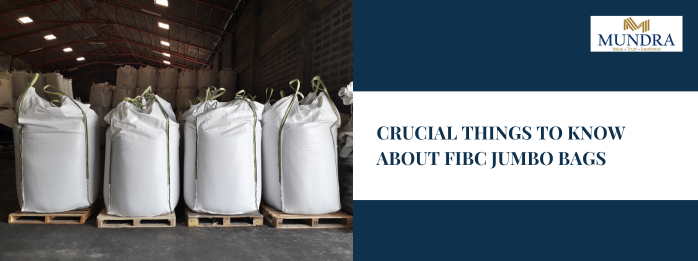FIBC jumbo bags, also known as Flexible Intermediate Bulk Containers, are widely used in various industries for transporting and storing bulk materials. These large-sized bags are designed to safely and efficiently handle different types of products, ranging from grains and chemicals to minerals and construction materials. If you are considering utilizing FIBC jumbo bags for your business needs, it is essential to understand their basics, key features, benefits, safety measures, and purchasing considerations. This comprehensive guide will provide you with the necessary information to make informed decisions and optimize your operations.
Understanding the Basics of FIBC Jumbo Bags
Definition and Uses of FIBC Jumbo Bags
FIBC jumbo bags, also referred to as bulk bags, are flexible containers made of woven polypropylene fabric. They are often cubic or rectangular in shape, equipped with lifting loops for easy handling. The primary purpose of these bags is to transport and store large quantities of dry or semi-solid materials.
FIBC jumbo bags find extensive application in industries such as agriculture, construction, chemicals, food, mining, and pharmaceuticals. They are commonly used for transporting goods like sand, fertilizers, cement, pet food, and powders. With their ability to hold up to several thousand kilograms of material, FIBC jumbo bags offer a practical and cost-effective solution for handling bulk commodities.
Let’s delve deeper into the world of FIBC jumbo bags and explore the different types available, each designed to meet specific requirements.
Different Types of FIBC Jumbo Bags
There are several types of FIBC jumbo bags available, each designed to meet specific requirements. These bags offer versatility and cater to various industry needs. Let’s take a closer look at some common types:
- Standard Bulk Bags: These bags are suitable for general applications and come in various sizes and capacities. They are widely used in industries such as construction and agriculture for transporting materials like gravel, sand, and soil. The standard bulk bags are designed to withstand heavy loads and provide excellent stability during transportation.
- Conductive Bulk Bags: Designed with antistatic properties, these bags are used to transport flammable materials and prevent the build-up of static electricity. Conductive bulk bags are commonly used in the chemical and pharmaceutical industries, where safety is of utmost importance. The antistatic properties of these bags ensure the safe handling and transportation of volatile substances.
- Vented Bulk Bags: These bags are equipped with small perforations to allow airflow, making them ideal for products that require ventilation. Vented bulk bags are commonly used in the agricultural industry for storing and transporting products such as potatoes, onions, and other perishable goods. The perforations in these bags help maintain the freshness and quality of the products by allowing proper air circulation.
- Liner Bags: Liner bags can be inserted into FIBC jumbo bags to provide an additional layer of protection against moisture, contamination, and leakage. These bags are commonly used in industries such as food and pharmaceuticals, where maintaining product integrity is crucial. The liner bags act as a barrier, preventing any external elements from coming into contact with the materials inside the FIBC jumbo bags.
With such a wide range of FIBC jumbo bags available, industries can choose the most suitable type based on their specific requirements. Whether it’s the standard bulk bags for general applications or the conductive bulk bags for transporting flammable materials, FIBC jumbo bags offer a reliable and efficient solution for bulk material handling.
Key Features of FIBC Jumbo Bags
Material and Design
FIBC jumbo bags are manufactured using polypropylene fabric, a sturdy and durable material that offers excellent tensile strength. The fabric is also UV stabilized to withstand prolonged exposure to sunlight, making these bags suitable for outdoor storage and transportation.
The design of FIBC jumbo bags includes various features like lifting loops, discharge spouts, and filling spouts. These features enhance the ease of handling, filling, and emptying the bags, thereby improving operational efficiency.
When it comes to the material used in FIBC jumbo bags, polypropylene is an ideal choice due to its exceptional properties. Polypropylene is resistant to moisture, chemicals, and abrasion, ensuring that the contents of the bag remain protected during storage and transportation. Additionally, the fabric is lightweight, making it easier to handle and reducing the overall weight of the bag when filled.
The UV stabilization of the polypropylene fabric is a crucial feature for FIBC jumbo bags intended for outdoor use. This ensures that the bags can withstand exposure to sunlight without degrading or losing their strength. Whether the bags are stored in an open yard or transported on open trucks, the UV stabilization provides added durability and longevity.
Load Capacity and Size
The load capacity of FIBC jumbo bags can range from 500 kilograms to several metric tons, depending on the bag’s size and design. It is crucial to determine the maximum weight your bag needs to carry and select a suitable capacity to ensure safe transportation and storage.
Moreover, FIBC jumbo bags are available in different sizes, allowing businesses to choose the dimensions that best accommodate their specific needs. Whether you require smaller bags for compact storage or larger bags for bulk transportation, there is a wide range of sizes available to cater to various requirements.
Custom sizes can also be manufactured to cater to unique needs. If your business has specific size requirements that are not readily available in the market, you can work with a manufacturer to create FIBC jumbo bags tailored to your specifications. This customization option ensures that the bags perfectly fit your intended purpose, maximizing efficiency and minimizing wastage.
Furthermore, the size of the FIBC jumbo bags plays a crucial role in optimizing storage and transportation. By selecting the appropriate size, you can ensure efficient utilization of space, both during storage and while loading the bags onto trucks or containers. This not only saves costs but also reduces the environmental impact by minimizing the number of trips required for transportation.
Benefits of Using FIBC Jumbo Bags
Efficiency and Versatility
FIBC jumbo bags offer significant advantages in terms of efficiency and versatility. Their large capacity enables bulk transportation, reducing the number of trips required compared to smaller bags or traditional packaging.
Moreover, these bags can be easily stacked, allowing you to maximize storage space while maintaining neat and organized warehouses. Their flexibility makes them suitable for various materials, eliminating the need for different packaging solutions, thereby streamlining logistics and reducing costs.
When it comes to efficiency, FIBC jumbo bags also excel in terms of loading and unloading. Their design allows for quick and easy filling and emptying, saving valuable time and labor. This efficiency translates into increased productivity and reduced operational costs.
Furthermore, the versatility of FIBC jumbo bags extends beyond their use in transportation and storage. These bags can also be customized to meet specific requirements, such as the addition of liners for moisture protection or the incorporation of specialized closures for enhanced product safety.
Environmental Impact
Using FIBC jumbo bags can also have positive environmental implications. Their reusability not only reduces waste but also minimizes the consumption of resources required for alternative packaging materials.
In addition, FIBC jumbo bags can be recycled, enabling the recovery of valuable materials. Proper disposal methods and recycling programs ensure that these bags contribute to sustainable practices and reduce the overall environmental footprint.
Moreover, the environmental benefits of FIBC jumbo bags extend to their manufacturing process. These bags are often made from recyclable and eco-friendly materials, further reducing their impact on the environment.
Additionally, the lightweight nature of FIBC jumbo bags plays a role in reducing carbon emissions during transportation. The lighter weight allows for more efficient fuel consumption, contributing to a greener and more sustainable supply chain.
Furthermore, the durability of FIBC jumbo bags ensures a longer lifespan, reducing the need for frequent replacements and the associated environmental impact of producing new bags. This durability also minimizes the risk of product loss or damage during transit, further reducing waste and promoting sustainable practices.
Safety Measures for FIBC Jumbo Bags
Proper Handling and Storage
While FIBC jumbo bags are designed to handle heavy loads, it is essential to follow proper handling procedures to ensure the safety of workers and the integrity of the bags. Some key safety measures include:
- Using appropriate lifting equipment and techniques to prevent accidents during loading and unloading.
- Avoiding dragging bags on rough surfaces to prevent damage to the fabric and possible leakage.
- Storing bags in a clean, dry, and well-ventilated area to prevent moisture absorption and mold growth.
Precautions for Specific Materials
When handling certain materials, additional precautions may be required to maintain safety. For example:
- Flammable or combustible materials should be transported in conductive bulk bags to prevent the accumulation of static electricity.
- Hazardous substances must be stored in bags specifically designed for such materials, in compliance with regulatory standards.
- Foods and pharmaceuticals must meet specific hygiene requirements, necessitating the use of food-grade or pharmaceutical-grade bags.
Purchasing FIBC Jumbo Bags
Choosing the Right Supplier
To ensure the quality and reliability of FIBC jumbo bags, it is crucial to select a reputable supplier. Consider the following factors when choosing a supplier:
- Experience and industry reputation
- Certifications and compliance with international standards
- Product customization options
- Quality control processes
- Customer support
Cost Considerations and Value for Money
While cost is an important factor, it should not be the sole determining factor when purchasing FIBC jumbo bags. Consider the overall value for money, taking into account factors such as durability, reliability, and supplier support. Choosing high-quality bags that meet your requirements will ensure long-term cost savings and operational efficiency.
In conclusion, understanding the crucial aspects of FIBC jumbo bags is essential for businesses involved in bulk material transportation and storage. By familiarizing yourself with their definition, uses, types, features, benefits, safety measures, and purchasing considerations, you can make informed decisions, optimize operations, and ensure the safety and efficiency of your logistics processes.

